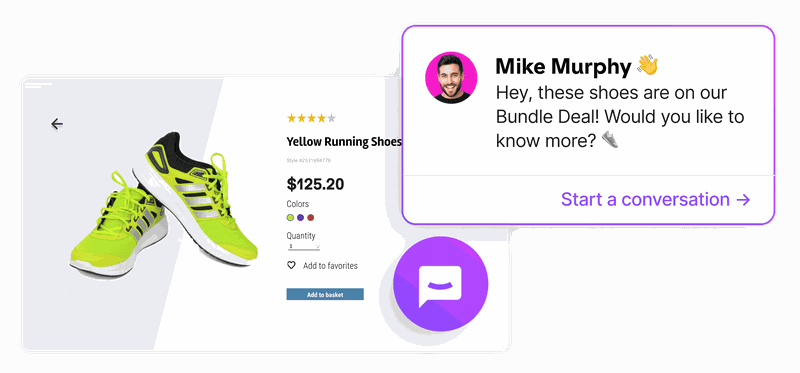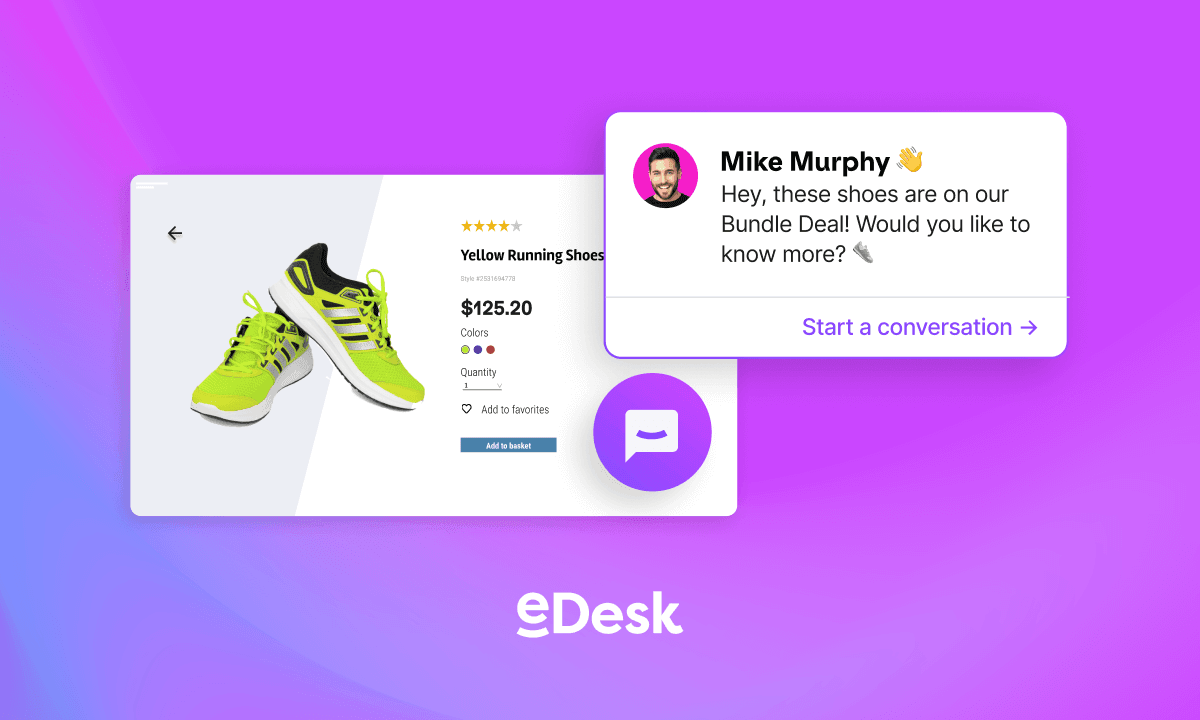This article will teach you more about the importance of an effective live chat feature for your brand and some of the best practices you can use to ensure your live chat feature is as good as possible.
How often have you encountered a poor live chat experience?
We’ve all been in that situation. You have an issue or query you want to discuss with the company, see the small live chat icon in the bottom right-hand corner of the page.
« Great! » You think, as your mouse moves over and clicks it. « I can use the live chat feature to get an answer quickly and continue with my purchase. »
However, if the live chat has not been implemented effectively, you can end up with a much less appealing experience and one that leaves you viewing the company in a bad light.
Some live chat prompts can be so poor that they even convince you not to purchase from that brand again!
Don’t worry. Your company’s live chat does not have to go this way. Here are some of the main ideas that we will discuss in this article:
- What are chat prompts: Firstly, we will look over exactly what a chat prompt is and why a good or bad one can change how a potential customer views your brand.
- The importance of using chat prompts in eCommerce: We will discuss the value of using chat prompts effectively in eCommerce and how they can impact the profitability of your brand.
- Best Practice for Live Chat Prompts: Finally, we will discuss some of the essential best practices for live chat prompts to ensure your live chat offering is perfect for your business.
What are Chat Prompts?

Live chat prompts are automated chat messages that appear for visitors to your website. You can link chat prompts directly in a lead capture form or your live chat function, and you can set parameters for how and when you want your visitors to get served a live chat prompt.
Chat prompts are a fantastic way to engage with potential customers at the moment they are most likely to convert while browsing your website.
If done effectively, chat prompts can significantly impact your company’s lead conversion percentage.
The importance of using chat prompts in eCommerce
The ultimate goal of any eCommerce website is to make sales. Because of this, many eCommerce businesses put huge effort into getting more visitors to their website. However, not every visitor will be ready to purchase without further information.
That is where chat prompts become so important. For website visitors requiring reassurance or guidance before making a purchase, a chat prompt can instantly offer them access to a vast knowledge base.
Hesitant customers will get answers to any questions they might have and help turn them from a concerned potential customer into a fully converted customer – see how in this short video:
Best Practice for Live Chat Prompts
Choose the right places to offer chat support
Firstly, it is important to remember that while live chat support is a fantastic customer satisfaction tool, it does not need to be offered everywhere to every customer.
Take time to consider where live chat would have the biggest beneficial impact on your business. For example, one great area for live chat is your company pricing page, as it will allow you to help warm leads convert into customers while they are still on your website.
Plenty of live chat software will allow you to display your live chat on certain pages or to certain customer demographics.
Many live chat tools, including the eDesk Live Chat feature, make it easy to display your chat on specific pages and locations, whether on your main website, inside an application, or attached to your contact page.
Ensure your grammar suits any possible scenario

This might seem like a strange thing to consider, but once you think more about every possible scenario your visitors might encounter, you will quickly realise how important this aspect is.
For example, you might think that setting your chat prompt as « What issue are you experiencing? » might seem like a good opener for your visitors to help them quickly have their issues resolved.
But what about the visitors that don’t have any issues? This type of message might make them concerned that many other paying customers have issues with your company and could even deter them from making a purchase when they are ready to do so!
Instead, you need to choose an opening message that suits your visitors’ potential needs. Some good examples include « How can I help you today? » or « Can I help you find what you are looking for? »
These opening lines are great because they offer visitors a helpful opener if they need support, but they are also generic enough to suit any situation.
Don’t take on more than you can handle

One of the greatest benefits of live chat software is that it is live. However, with that comes added stressors and requirements.
Customers anticipate that responses via live chat will be much quicker than if they call or email your business, so making sure that is the case is essential.
Make sure you only offer live chat where you can meet these requirements.
It is also worth bearing in mind that just because an issue comes through via chat doesn’t mean the problem will be simple to resolve. How detailed the issue might be will vary from customer to customer and could take a significant time. Consider this when setting your parameters for how long your customer waitlist will be.
Live chat offers an excellent customer experience where their issues get resolved quickly and effectively.
However, that all goes out the window if you call them by the wrong name in a live chat session or engage customers irregularly and without offering true support.
It is important to take a little time to verify each response that gets sent and confirm who the recipient is. Ultimately, it is better to have your customers wait a few seconds more with their live chat first contact resolution rather than provide them with a bad experience.
Only make promises you can keep

It is important to remember that customers expect live chat conversations to offer instant responses to their queries.
If not, you can be sure that customer satisfaction will drop significantly. Customers waiting for support tend to opt for the chat window over an email due to their expectation that the live chat tool will offer faster support.
It is important to manage your customer’s expectations and set live chat support hours that are achievable for your business. Ensure these hours are visible, and then ensure you stick to them.
Once you have set your hours, take time to review chat transcripts to understand whether the support team has been able to meet the hours you are advertising or whether they are offering poor customer service.
If you identify great results, the response time is being met, and the customer experience is strong, you can try increasing those hours in the future.
Remember, it is much easier to increase phone support hours due to strong customer satisfaction with your online chat than trying to reduce hours because live chat performance is poor.
Watch, learn and adapt

Talking to a support agent is a great way to watch, learn, and advance your live chat support. Live chat agents can tell you how many chats they can handle at once, what a current chat conversation looks like, and what the live chat metrics look like.
When you are setting or altering key performance indicators, make sure you do so with the help of some of your senior live chat agents, as they are best placed to determine whether those KPIs are achievable or not.
Communicate with your team to understand what aspects of your live chat are working well and which aspects of a website visitors chat session you could improve.
Remember to take breaks

This tip might seem simple, but you would be amazed at how many people who work in a live chat instant response team don’t feel like they can take a break.
Some believe that taking a break will slow them down, and they must be working every second of the day to reach the right live chat metrics.
But taking breaks is essential to keep your mind fresh and ready to offer the best live chat solution possible.
If you work in your live chat support team, or you handle a team of live chat support workers, ensure regular breaks get taken to grab a coffee or just to stretch your legs.
The best support gets provided when you feel your best!
Train your team

Handling chat software is significantly different from handling email or phone support, and your team must behave differently and apply different skills to be successful.
Here are several things you need to consider when you support customers via live chat:
- How will you start a conversation with customers in live chat? Will you lay out a templated opener that every customer receives, regardless of which page they are on, or will you implement several different options to help the experience feel unique? Both options have their pros and cons, so it is important to train your team on your chosen option to minimise mistakes.
- How do you want your team to respond to more detailed or extensive queries? Sometimes, your response to a customer query might look better broken down into different messages in the chat window. Or maybe you would prefer that all of the information needed sits within one message? For continuity across your business, you must choose one option and train the team to adhere to that option.
- When and how will you move a chat query into a phone call or email? It might be that the particular query the customer has, requires either email or phone support. How does your team identify that this is the case, and what steps should they take to move that chat support into another support avenue? It is also essential that the move gets tracked to ensure that no queries get lost in the shuffle.
- Of those that you employ, who is the best person to manage the chat channel, and what hours should your chat channel be open? Certain team members will be better suited than others to manage the chat channel, and it is important to identify those staff members and teach them how to manage the channel.
One great way to help train your team on what a live chat best practice looks like is to ask them to go online on your competitor’s websites and start a few live chat queries.
From there, you can quickly identify what a successful chat is, what that entails, and potential issues other companies have that you can look to avoid.
Don’t act like a robot

Take a moment to consider some of the poor chat experiences you have had with companies. What would you have done differently when you look back at those situations?
Often customer chat robots seem like they are not dealing with your problem specifically and instead categorise you with other customer complaints.
This categorisation can leave customers feeling unheard and frustrated. If you do implement some form of non-human responses in your live chat journey, you need to make automated chat prompts as natural and as human-like as possible.
« 87% of customers believe brands need to put more effort into seamless experiences. » Natalie Petouhoff, Customer Think.
Check this article out if you struggle to deal with frustrated customers.
Don’t put your chat prompt on the checkout page

If you choose to use the eDesk Live Chat feature, you will have the power to add a chat prompt to as many or as few pages as you want to.
However, that doesn’t mean you should have a chat prompt on every page. The checkout page is one example where you should avoid using a prompt. At this stage, a customer has added a product to their basket and clicked through to the checkout page.
You want the purchase process to be as quick and seamless as possible at this phase. Therefore, you don’t want to slow down your customer with a live chat prompt pop-up.
It will either force them to stop purchasing and close the window or worse: it will make them doubt their purchase and potentially cancel their transaction.
While it is worth having the live chat software implemented on your checkout page, in case there are any final queries from customers, you should not include a live chat prompt at this stage.
Don’t leave customers hanging

Finally, you must remember the most important benefit of implementing live chat support on your website. It is an opportunity for your customers to access real-time support. Therefore, response time is essential for maintaining a strong customer experience for your website visitors.
Unlike email, your live chat agents need to be willing and ready to stay the course with every customer while their issue is resolved or escalated.
That is why establishing expectations before the chat is important, as these boundaries will benefit your customers and your staff.
A quick and easy way to highlight your live chat availability to customers is to list your office hours clearly on your contact page.
With regards to your team, when shifts end and start, try to implement a small handover period that ensures your team can leave on time each day, without a customer getting left waiting for a response while the next employee starts their shift.
Another option available to you is to schedule their shifts to end one hour after you stop running your live chat feature to ensure any final calls can be wrapped up and they can leave work on time.
Conclusion
Now you have all the information you need to implement the perfect live chat prompts and help turn even more website visitors into paying customers for your brand. If you improve your lead conversion numbers, you can take the budget out of your sales team and allocate it elsewhere. Or you could reinvest that increased revenue in more sales budget and have more visitors reach your live chat onsite feature.
Don’t forget some of the key takeaways that we have covered in this article:
Choose the right places to offer chat support: It is important to remember that while live chat support is a fantastic customer satisfaction tool, it does not need to be offered everywhere to every customer.
Ensure your grammar suits any possible scenario: You need to choose an opening message that suits all the potential needs of your visitors.
Don’t take on more than you can handle: Customers anticipate that responses via live chat will be much quicker than if they call or email your business, so making sure that is the case is essential.
Only make promises you can keep: It is important to remember that customers expect live chat conversations to offer instant responses to their queries. If not, you can be sure that customer satisfaction will drop significantly.
Watch, learn and adapt: Talking to a support agent is a great way to watch, learn, and advance your live chat support.
Remember to take breaks: Taking breaks is essential to keep your mind fresh and ready to offer the best live chat solution possible.
Train your team: Handling chat software is a significantly different role than handling email or phone support, and your team must behave differently and apply different skills to be successful.
Don’t act like a robot: Often, customer chat robots do not deal with your problem specifically and instead categorise you with other customer complaints.
Don’t put your chat prompt on the checkout page: The checkout page is one example where you should avoid using a prompt. At this stage, a customer has added a product to their basket and clicked through to the checkout page.
Don’t leave customers hanging: Finally, you must remember the most important benefit of implementing live chat support on your website. It is an opportunity for your customers to access real-time support.
Want to get started with Live Chat? Get started today and see how you can increase sales and customer satisfaction with Live Chat.

